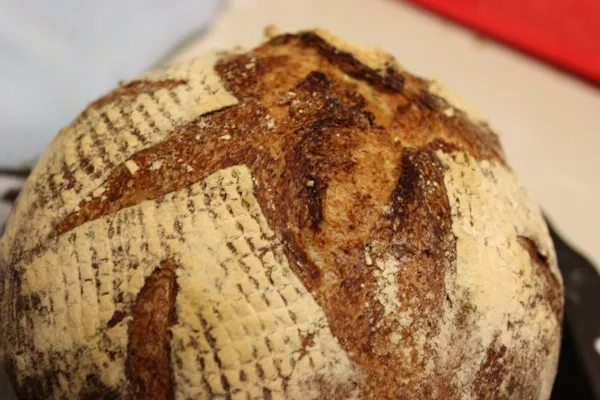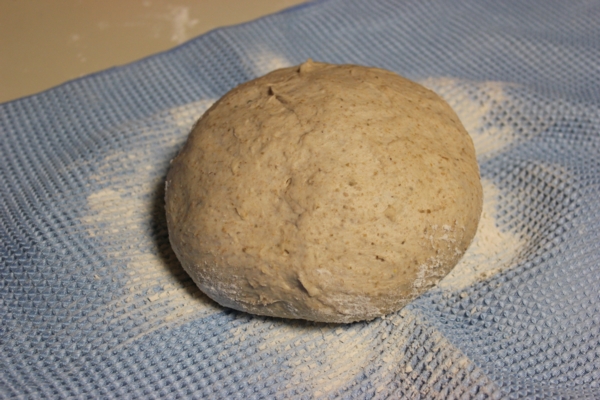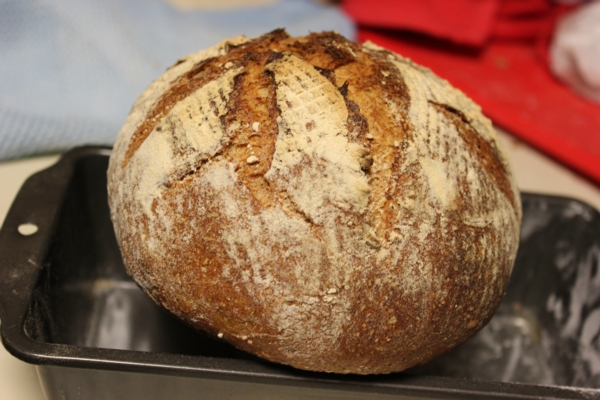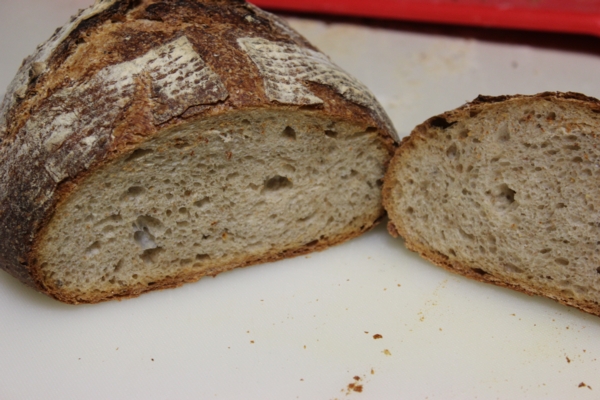
The first month of bread has been refreshing, and tasty :) Many mistakes and trial and error, fun stuff.
I really wanted to get to sourdough and I'm having success with my starter. I'm reading books, but TFL is an amazing translation tool for application.
I haven't made that many breads and something about my kitchen accelerates things - my kitchen being me, my ingredients and my environment. I seem to go from maybe to overproof rather quickly so I worked with that and ignored all recommended time and tried to talk to my bread. I also skipped the whole follow recipes until you achieve consistency factor and just made changes to get me closer to what I want in bread - sourdough (fermented), baguette and boule for their taste and texture, and grain.
Still baby steps but SD boules in a dutch oven at least fit the shape of my existing equipment more than baguettes so I'm giving them a run for learning before I tackle SD baguettes. Held it's shape and I solved the sticking issue in proofing.

10% whole grain rye - amazing flavor difference. A new learning curve - the grain texture cuts the gluten strands if worked too much, or that is what it seems like. I pushed it and I need much more practice on scoring and shaping and proofing - but this is actually a boule isn't it? A very beginner boule, but actually boule shaped and risen? On the right track sort of thing? Crumb is very tasty, rye makes a big difference and I think I can up the hydration and with more experience shaping and proofing, get the more open crumb I like - I like the taste and texture of holes. I think I found my baseline to bridge from.

SD starter is 1 week white following dabrownman's "no muss no fuss" refrigerated lower hydration, no waste method with a 3 tier build and over night retard. That particular post made everything from BBA, FWSY, and Glezer's AB make practical sense for maintenance and baking fitting my schedule.

TFL Handbook on Rye inspired me to try a 10% whole grain Rye loaf while still being very new to the whole bread thing. Glad I did, the final bread tastes much better than anything I've tried before. It's not dense and not over baked. Bold I like, but I like blistery and done before over bake and I'm starting to understand my oven. Holes throughout, no lift offs of dense bottoms, it's not gummy and it tastes great and has a very decent mouth feel (my family cracks up that there are people who understand that I think that is a real important thing :). The grain tearing factor in the dough - just my inexperience or is there a better route?
I'm giving myself a gold star on the forehead for a kindergarten SD Rye Boule. The high flour thing with proofing still bugs me, I don't like all the flour on the crust like some may but I like sticking even less.
| grams per pound | 453.5924 | |||||||||
| 300 | total flour | |||||||||
| 110 | g | Warm Water (Well) | 70% | |||||||
| 200 | g | Poolish Starter (Gen AP) | 39% | total weight | ||||||
| 130 | g | Flour, 100g KAF AP, 30g Gen AP | 77% | |||||||
| 40 | g | Flour, KAF WW | 13% | |||||||
| 30 | g | Flour, Rye | 10% | |||||||
| 7 | g | Salt | 2% | |||||||
| 517 | g | 1.14 | pounds | |||||||
| 1. Mix Water, WW & Rye Flour, autolyse 30 minutes | ||||||||||
| 2. Add remaining flour and starter, rest 30 minutes. | ||||||||||
| 3. Add salt | ||||||||||
| 4. Slap and Fold to develop strong gluten. | ||||||||||
| 5. Stretch and Fold once, round out dough, rest 10 minutes - 3 times total | ||||||||||
| 6. Bulk rise 2-4 hours, or until the dough has increased 1.5 times it's original size. Took 1 hour 15 minutes. | ||||||||||
| 7. Shape and tension pull, rest 10 minutes | ||||||||||
| 8. Re-do tension pull for final shaping - this was needed but the grains in the Rye seem to have started to tear dough skin. | ||||||||||
| 9. Proof in flour lined basket/towel 2-3 hours until 1.5 times pre-proof volume. Took 1 hour. | ||||||||||
| 10. Flip and place in pre-heated dutch oven, score and bake. | ||||||||||
| Pre-heated at 500F, scored in the very hot DO with scalple blade. Dropped temp to 450F and kept coverd 25 minutes. Uncovered and dropped to 425F for 10 minutes, turned for another 10. Turned again and turned oven off closed for 5 minutes, then turned and left oven cracked open for 5 minutes. | ||||||||||
| Placed across a bread pan to cool and it sang and crackled for at least 20 minutes. | ||||||||||
| ||||
- Anconas's Blog
- Log in or register to post comments
I also traveled with you on your discovery write up. Neat.
The tearing or resistance of the dough while kneading could be bran bits or more likely, could be the later additions of flour that haven't fully hydrated yet. To soften bran bits, simply extend the autolyse in step 1 getting as much of the whole flours wet that you can. Give those heavier flours (rye, ww) a few hours covered and you will also see a big difference in dough stickiness as gluten develops on its own during this time. If the autolyse seems too dry with the rye, move the rye into the sourdough starter to soak and react with the acids there before mixing up the dough.
I am confused with the term "poolish starter" in the ingredient list. I think you meant, sourdough starter instead. A poolish is a preferment consisting of commercial yeast+water+flour+time to ferment and doesn't involve a nurtured sourdough culture.
The flour on the outside of the loaf can be managed with a stiff little brush set aside for this special purpose, to brush off excess flour. I tend to brush off flour in the bottom of the sink or outside letting the wind take it. Then there is less flour all over the kitchen and table when it's time to slice. If you want to, this toasted flour can be carefully saved and thrown into the next loaf of bread for added flavour.
Discovery write up? Sounds interesting but I don't think that was me :-)
I used a sourdough starter, not a commercial yeast preferment - if you're confused, think how I feel lol. "poolish starter" is a term used in the original recipe I modified from here http://stellaculinary.com/recipes/70-hydration-sourdough-boule
I'm trying the rye in the stater final build with an overnight retard and I'll extend the autolyse with the ww tomorrow, appreciate the suggestions. I made this recipe as originally written previously without the rye and it didn't have the tearing issues like it did with the rye, so I thought I'd start there in fine tuning.
Didn't think about a use for the toasted flour, I just prefer the crust flavor without it. Tried a basting brush, it didn't help much but made a big mess. I'll try a new toothbrush and the front porch tomorrow.
bread. I've never tried storing a white starter the No Muss, No Fuss way. I don't know how many weeks you will get but, following your lead, I did make the final feeding for my rye starter a white one to stiffen it up for storage:-)
Great advice from Mini as usual. I take it a step further tan some in that I sift out all the hard bits from the milling of the flour and feed that to the starter for the levain build. That way that are the wettest for the longest and hopefully much softer and less likely to cut gluten strands. Then i like to hydrate the rest of the flour by autolysing it for at least and hour to make sure that it soaks up as much of the water as possible, As you increase the hydration for nigger holes that have no taste at all, , the longer you will want to autoplyse the dough flour.
I think once you find a proofing basket the too much flour problem,will disappear. I got mine at Goodwill for 50 cents each on Dollar Thursdays :-I In fact, i got all my baking stuff from stone,peel, DO's, cloches, clay bakers, pans, etc. It is amazing how much baking equipment you can get for $20 there. Once the baskets are used I just dust a bit of rice flour only in them and then shake most of it out. I don't have any white marks on my breads this way - just the way like it. Some folks like the white marks the basket and flour will leave on their breads though.
I suppose the next thing would be to do a 1 hour bulk ferment and then shape, basket, bag and proof in the fridge for 12 hours. It should help the flavor greatly and possibly the crumb as well. You a e making great strides in a short time.
Well done and happy baking .
Thanks dab, I did read all the comments on the no muss no fuss post and realize you keep rye, not white. I did split it off from the 100% hydration starter to run in parallel to see how long and well it does last. The rye white cross sounds interesting!
I thought the sifting out the harder bits that you have posted about had to do with home milled grains, didn't think it applied to grocery store flour. I'm definitely going to try a longer autolyse and ways to get the rye softer. It was unique to work with for the first time, I had no idea how much coarser it was. Tastes really good so worth figuring out. Longer autolyse for higher hydrations, that now makes sense. The 70% hydration white/ww with no autolyse was much wetter to work with than the same hydration white/ww/rye with autolyse, even though it was a short duration. The time and thirsty grains made a noticeable difference.
My basket hunt continues, adding the goodwill in town to my hunt next time I make a run, wouldn't have thought to check there for baking stuff. The flour makes pretty patterns and folks post some gorgeous breads. I probably used an awful lot but the last loaf stuck crazy bad so I wasn't taking chances.
I've considered a refrigerated proof, nervous though since I'm still working on what seems to be accelerating my proofs at room temp, it is on the list though. Thanks a bunch for the pointers! I'm excited I got some actual rise and oven spring for a boule-ish loaf :)